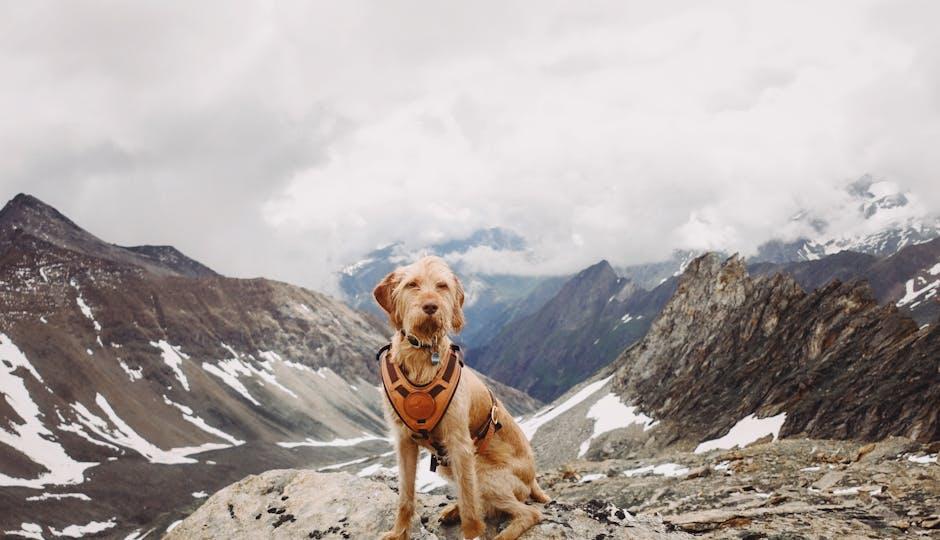Embarking on a hiking adventure with your furry companion can be one of the most rewarding experiences for both you and your dog. The call of the wild, the crunch of leaves underfoot, and the shared joy of discovery in nature create memories that last a lifetime. However, before you and your canine pal hit the trails, it’s essential to ensure that your dog is well-prepared for the journey ahead. Training your dog for hiking not only enhances their safety and comfort but also strengthens the bond between you. In this guide, we’ll explore practical steps to prepare your dog for the great outdoors, ensuring that your adventures are filled with fun, safety, and mutual understanding. Whether you’re a seasoned hiker or a beginner, these tips will help you and your four-legged friend enjoy every step of your outdoor escapades.
Preparing Your Dog Physically and Mentally for the Trail
Before embarking on a hiking adventure with your furry friend, it’s crucial to ensure they’re ready both physically and mentally. Start with gradual physical conditioning. Just like humans, dogs need to build stamina. Begin with short walks and progressively increase the distance and intensity. Pay attention to their pace and breathing to avoid overexertion. Regular check-ups with the vet will help ensure your dog is fit for such activities.
Equally important is mental preparation. Train your dog to respond to basic commands such as “sit,” “stay,” and “come” in various environments. This is vital for their safety on the trail. Introduce them to different terrains and environments to build confidence and adaptability. Consider these tips:
- Socialize with other dogs and people: This helps them remain calm and friendly during encounters on the trail.
- Familiarize with gear: Get them used to wearing a harness and carrying a small pack.
- Practice recall commands: Ensure they reliably return to you, even with distractions around.
By preparing your dog both physically and mentally, you pave the way for a safe and enjoyable hiking experience for both of you.

Choosing the Right Gear for Your Canine Companion
When embarking on hiking adventures with your dog, selecting the appropriate gear is essential to ensure a safe and enjoyable experience for both of you. The right gear can make all the difference in comfort and safety. Here are some key items to consider:
- Harness: Choose a harness that is comfortable, secure, and easy to put on. Look for options with adjustable straps and a padded chest plate to prevent chafing.
- Leash: A durable, lightweight leash is crucial. Consider a retractable or hands-free leash for greater flexibility and ease of movement.
- Boots: Protect your dog’s paws from rough terrain and extreme temperatures with sturdy boots. Ensure they fit well and allow your dog to walk naturally.
- Backpack: If your dog is fit and healthy, a backpack can help them carry their own water, food, and other essentials. Make sure it’s well-fitted and not overloaded.
Remember, every dog is different, so it’s important to test the gear before setting off on a long hike. This ensures that everything fits well and that your furry friend is comfortable and ready to explore the great outdoors!
Training Techniques for a Safe and Enjoyable Hike
Embarking on a hiking adventure with your furry friend can be a delightful experience if your dog is well-prepared for the trails. Begin by ensuring your dog is comfortable with basic obedience commands such as sit, stay, and come. These commands are crucial for maintaining control and ensuring safety on unpredictable terrains. Gradually introduce your dog to different types of environments, starting with short walks in local parks and slowly progressing to more challenging trails. This helps in building their stamina and familiarizing them with various natural scents and sounds.
- Leash Training: Practice walking on a leash to prevent sudden pulls or lunges. Opt for a hands-free leash for better control and comfort.
- Paw Protection: Consider booties to protect your dog’s paws from rough terrain and extreme temperatures.
- Hydration Habits: Train your dog to drink from a portable water bowl to keep them hydrated during the hike.
- Socialization: Introduce your dog to other hikers and dogs to ensure they are well-behaved around strangers.
With patience and consistent training, your dog will soon be a confident hiking companion, ready to explore the great outdoors safely and joyfully.
Understanding Trail Etiquette and Wildlife Safety for Dogs
When embarking on a hiking adventure with your furry friend, understanding the unspoken rules of the trail and ensuring wildlife safety is paramount. A well-behaved dog not only makes the journey enjoyable for you but also for fellow hikers and the natural inhabitants of the trail. Here are some essential tips to keep in mind:
- Stay on Leash: Even if your dog is well-trained, keeping them on a leash helps protect both the local wildlife and your pet from unexpected encounters.
- Yield to Others: When encountering other hikers or animals, step to the side and give them the right of way. This is especially important on narrow paths.
- Leave No Trace: Ensure you pick up after your dog and dispose of waste properly to preserve the natural beauty of the trail.
Wildlife encounters can be thrilling, but they should be approached with caution. Dogs are naturally curious, which can sometimes lead to dangerous situations. To keep both your pet and wildlife safe, consider the following:
- Keep Your Distance: Teach your dog to maintain a safe distance from wildlife. This can prevent stress or aggression from both sides.
- Noise Awareness: Use bells or other noise-making devices to alert animals of your presence, reducing the chance of startling them.
- Respect Habitat: Avoid letting your dog dig or disturb natural habitats, which can impact the ecosystem.
By adhering to these guidelines, you can ensure a harmonious and safe experience for you, your dog, and the wildlife you encounter.

